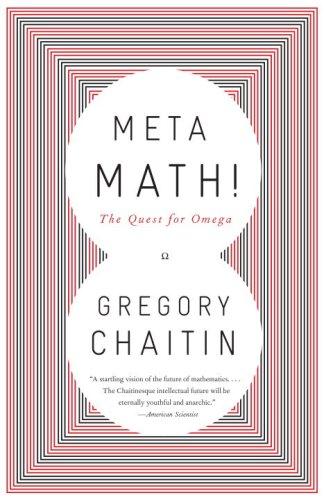.mau. ha recensito Meta Math! di Gregory Chaitin
Review of 'Meta Math!' on 'Goodreads'
4 stelle
Gregory Chaitin si definisce un matematico quasi-empirista, filosofeggiante sulle orme di Leibnitz. Non credetegli troppo, se non per la parte filosofica. In questo libro più che di matematica si parla di metamatematica, e l'unica parte che può essere vista come empirista è data dal fatto che le dimostrazioni sono generalmente evitate, e Chaitin preferisce fare dei bei riquadroni manco avesse da fare dei lucidi. Il sottotitolo del libro, "Alla ricerca di Omega", è dovuto al fatto che il culmine del libro è la definizione di Ω, il numero che codifica la probabilità che un programma scelto a caso e fatto girare con input casuale su un computer prefissato termini. Ω ha un valore ben preciso per ogni computer dato, ma è impossibile sapere quale, e non sappiamo nemmeno quanto possiamo approssimarlo: paradossalmente, pur essendo perfettamente definito, è anche perfettamente casuale. L'approccio di Chaitin è non convenzionale, riprendendo molti risultati del …
Gregory Chaitin si definisce un matematico quasi-empirista, filosofeggiante sulle orme di Leibnitz. Non credetegli troppo, se non per la parte filosofica. In questo libro più che di matematica si parla di metamatematica, e l'unica parte che può essere vista come empirista è data dal fatto che le dimostrazioni sono generalmente evitate, e Chaitin preferisce fare dei bei riquadroni manco avesse da fare dei lucidi. Il sottotitolo del libro, "Alla ricerca di Omega", è dovuto al fatto che il culmine del libro è la definizione di Ω, il numero che codifica la probabilità che un programma scelto a caso e fatto girare con input casuale su un computer prefissato termini. Ω ha un valore ben preciso per ogni computer dato, ma è impossibile sapere quale, e non sappiamo nemmeno quanto possiamo approssimarlo: paradossalmente, pur essendo perfettamente definito, è anche perfettamente casuale. L'approccio di Chaitin è non convenzionale, riprendendo molti risultati del XX secolo in chiave informatica; a parte l'astrattezza, che uno si può aspettare, non mi è piaciuto per nulla lo stile di scrittura, troppo enfatico e pieno di parole e frasi in neretto, ma soprattutto di punti esclamativi. Si vede che io sono un matematico più sobrio.

